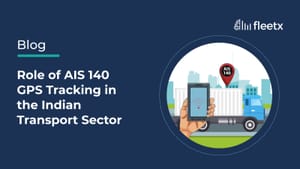In logistics, every kilometre counts — in cost, in performance, and in reliability.
Whether you run 5 trucks or 500, your profitability depends on how efficiently they move, how transparently fuel is managed, and how accurately every trip is recorded.
That’s where GPS tracking for trucks steps in — transforming fleet visibility into cost control, driver accountability, and data-backed decision-making.
Why Fleet Businesses Are Moving to GPS Tracking
Traditional fleet management relies on manual updates, phone calls, and trust.
But as operations grow, this system breaks down — leading to fuel loss, unplanned downtime, and unclear accountability.
A truck GPS tracking system connects every vehicle in your fleet to a single dashboard. You can see:
- Where each truck is right now
- Which route it’s taking
- How much fuel it’s consuming
- When the next service is due
It’s not just tracking — it’s total operational control.
How GPS Tracking Works in Heavy Duty Vehicles
Every GPS tracker connects to a network of satellites orbiting the Earth. By calculating distance from three or more satellites (a process called trilateration), it determines the truck’s exact position.
This live data is sent to your fleet management software, where you can monitor routes, fuel, and performance in real time — all from one dashboard or mobile app.
So, instead of chasing updates, you get live visibility of your entire fleet.
The Real Problems GPS Tracking Solves
Rising Fuel Costs and Fuel Theft
Fuel can account for up to half of your total fleet expenses.
GPS tracking helps cut fuel costs by:
- Monitoring fuel consumption per trip or driver
- Detecting idling and harsh driving behaviour
- Flagging refuelling and fuel drain events in real time
- Verifying route efficiency to reduce unnecessary kilometres
With integrated fuel level sensors, you can even detect fuel theft — a sudden dip in fuel while parked or off-route instantly triggers an alert.
Result: 10–15% reduction in monthly fuel spend.
Maintenance Delays and Odometer Tampering
Manual odometer readings often get misreported — intentionally or by mistake — leading to delayed servicing and unexpected breakdowns.
GPS-based odometer tracking gives you accurate, tamper-proof distance data.
Your system can automatically:
- Send service reminders by kilometre
- Schedule preventive maintenance
- Compare performance across vehicles
Result: Reduced breakdowns, longer asset life, and consistent uptime.
Low Route Visibility and Delivery Delays
When trucks move across states, visibility gaps cause delays and customer complaints.
A truck GPS tracking system fixes that with:
- Real-time truck location and ETA
- Geofence alerts for arrival or departure
- Route deviation reports for driver monitoring
Result: On-time deliveries, smoother dispatch planning, and fewer missed SLAs.
Driver Behaviour and Accountability
Driver behaviour directly impacts fuel efficiency and safety.
GPS tracking lets you monitor:
- Speeding, idling, and harsh braking
- Trip duration and rest breaks
- Unauthorised route detours
This builds transparency, improves driving habits, and enhances safety for both driver and asset.
Result: Lower fuel consumption and higher driver performance.
How GPS Tracking Improves Your Fleet KPIs
Once GPS data flows into your fleet dashboard, your numbers start telling a more accurate story:
| KPI | Before GPS | After GPS |
|---|---|---|
| Fuel Efficiency (km/l) | Estimated | Measured & improved by 10–15% |
| Maintenance Compliance | Manual & irregular | Automated & on-time |
| Vehicle Utilisation Rate | Unknown | Data-driven allocation |
| Cost per Kilometre | Approximate | Precisely calculated |
| Fleet Uptime | Reactive | Predictive |
When your decisions are based on verified GPS data, you manage smarter, not harder.
The ROI That Speaks for Itself
Implementing a GPS tracking solution for trucks isn’t just about convenience — it’s about measurable impact:
- Fuel cost savings: ₹10,000–₹15,000 per truck per month
- Maintenance savings: up to 25% reduction in unplanned repairs
- Operational productivity: faster trip turnaround, fewer idle hours
- Better customer service: accurate ETAs, faster communication
The system pays for itself within months — and keeps giving returns year after year.
Choosing the Right Truck GPS Tracking Solution
When selecting a GPS tracking partner, look for:
- Accurate real-time tracking (satellite + cellular hybrid connectivity)
- Fuel monitoring integration for theft detection
- Odometer and maintenance automation
- Driver behaviour analytics
- 24/7 support and easy onboarding
A good provider should deliver visibility + reliability, not just raw data.
Transform the Way You Manage Your Fleet
If your business depends on trucks, GPS tracking is not a luxury — it’s a necessity.
It’s the simplest way to reduce fuel loss, prevent tampering, and build operational control across routes, drivers, and deliveries.
With one system, you can:
- Monitor every truck in real time
- Track every litre of fuel used or lost
- Schedule maintenance automatically
- Compare driver and vehicle performance
That’s how smart fleets stay efficient, compliant, and profitable.
Final Words
You don’t have to guess where your trucks are — you can know.
See how GPS tracking can help you save fuel, prevent theft, and optimise fleet performance in real time.
In logistics, control equals profit — and GPS tracking for trucks gives you both.



